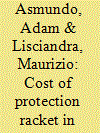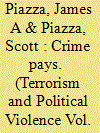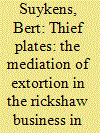|
|
|
Sort Order |
|
|
|
Items / Page
|
|
|
|
|
|
|
| Srl | Item |
| 1 |
ID:
129036


|
|
|
| 2 |
ID:
083098


|
|
|
|
|
| Publication |
2008.
|
| Summary/Abstract |
The purpose of this paper is to estimate the current cost of protection rackets in Sicily. By means of a database constructed on judicial evidence, it has been possible to come up with an estimate of the average and total costs of the protection-money system, as well as finding out in which sectors of economic activity and in which provinces is most pervasive. The average monthly payment is approximately 600 euros per business, with stronger effects in those areas with a relatively more traditional economic structure. As a whole, in monetary terms, the protection racket in Sicily accounts for over 1.4% of gross regional product. Finally, the paper supports the hypothesis that in most cases, the pervasive presence of the mafia represents a considerable constraint on business growth.
This paper partially draws on an earlier study of the same authors for the Fondazione Rocco Chinnici, and published in Italian in 2008 as 'Un tentativo di stima del costo delle estorsioni sulle imprese a livello regionale: il caso Sicilia', in A. La Spina (eds.) , Bologna, Il Mulino. This paper partially draws on an earlier study of the same authors for the Fondazione Rocco Chinnici, and published in Italian in 2008 as 'Un tentativo di stima del costo delle estorsioni sulle imprese a livello regionale: il caso Sicilia', in A. La Spina (eds.) I costi dell'illegalitBologna, Il Mulino.
|
|
|
|
|
|
|
|
|
|
|
|
|
|
|
|
| 3 |
ID:
172196


|
|
|
|
|
| Summary/Abstract |
What impact does engagement in crime have on terrorist group survival? In theory criminal activity may decrease group survival by damaging group legitimacy or prompting government crackdowns. Conversely, crime might boost group survival by facilitating access to revenues or by further taxing state policing capacity. Moreover, different types of crime might have different effects. We investigate the impact of crime on terrorist group survival using cross-sectional data on 578 terrorist groups observed between 1970 and 2007. We find that engagement in crime reduces a group’s chance of demise by around 50% and extends its lifespan by around 7 years on average. Terrorist groups involved in narcotics are less likely to end by police or military force, but are also less likely to win political concessions. We find that groups involved in extortion live the longest and are also less likely to end by force or by splintering.
|
|
|
|
|
|
|
|
|
|
|
|
|
|
|
|
| 4 |
ID:
182427


|
|
|
|
|
| Summary/Abstract |
The emergence of the novel coronavirus (COVID-19) in November 2019 has nearly brought the world to a halt. Recording her first COVID-19 case on 27 February 2020, the Nigerian government’s default response to the pandemic was to lock down major parts of the country, among other measures. Despite the nationwide lockdown, inter-state travel continued unabated as many travellers bribed their way through the different checkpoints mounted by security agencies. As a result of the prevalence of ‘normed corruption’, the lockdown only created opportunity for brazen extortion by law enforcement officials. Using the institutional corruption theory as our framework of analysis, and coupled with the use of both primary and secondary data generated during the lockdown, the paper noted that entrenched culture of extortionate policing in the ranks of security forces meant that arrest and prosecution of violators of the lockdown became a distant concern. The result is that COVID-19 suspects or carriers travelled from one state to another without being detected. It concludes that Nigeria should leverage lessons learned from policing COVID-19 in framing future responses in containment
|
|
|
|
|
|
|
|
|
|
|
|
|
|
|
|
| 5 |
ID:
034504


|
|
|
|
|
| Publication |
Houndmills, macmillan Press, 1987.
|
| Description |
xxii, 228p.
|
| Standard Number |
0333419375
|
|
|
|
|
|
|
|
|
|
|
|
Copies: C:1/I:0,R:0,Q:0
Circulation
| Accession# | Call# | Current Location | Status | Policy | Location |
| 029416 | 363.32/CLU 029416 | Main | On Shelf | General | |
|
|
|
|
| 6 |
ID:
190161


|
|
|
|
|
| Summary/Abstract |
Around half a million rickshaws ply the streets of Dhaka, Bangladesh. To deal with the problem of theft, owner associations started to issue ‘thief plates’. These allow owners to get their rickshaws back at a reduced price. They also offer a protection against theft. This article argues that these plates form material mediators brokering relations between rickshaw owners and drivers, and thieves. Building on the literature on state-citizen brokerage, bureaucratic materialities and Anton Blok’s work on mafia, it wants to highlight the centrality of mediation in understanding practices of protection/extortion. It also aims to contribute to the literature on mafia in South Asia, showing the need to pay attention to norms of non-violence when dealing with violent or criminal strongmen.
|
|
|
|
|
|
|
|
|
|
|
|
|
|
|
|
|
|
|
|
|